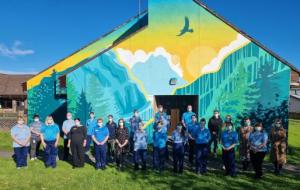Therapeutic Activities Contributing to Patient Care at Leverndale Hospital

Leverndale Hospital offers Mental Health Inpatient care to adults with a range of complex mental health difficulties in the South of Glasgow. Patients benefit from having a motivated, innovative and dedicated group of staff consistently providing a diverse range of therapeutic activity across the hospital site.
Glasgow City Health and Social Care Partnership (HSCP) staff providing therapeutic activity at Leverndale Hospital were finalists in the Mental Health category at the recent Scottish Health Awards in November 2021.
Carol Donoghue, Inpatient Operational Nurse Manager, made the nomination. Carol said: “The opportunity to engage patients in meaningful therapeutic activity benefits patient outcome, optimises their experience of care and enhances personal recovery. Together, this group of staff demonstrate cohesiveness working together to achieve this and are successful in delivering compassionate, collaborative high quality care.
“However, in the context of the past 18 months, their efforts and ability to maintain input, whilst looking after some of the most vulnerable, challenging patients in the most difficult circumstances, is unparalleled in supporting safe, effective patient-centred Mental Health care and treatment in the most challenging of times”
One of the key characteristics of recovery orientated practice is the delivery of meaningful activity within the Mental Health Inpatient setting. Activities help maximise therapeutic benefits and prevent a ward from being seen as a place of containment. This has been particularly important in a time when a national lockdown had been imposed for the COVID-19 pandemic.
Like so many working throughout the course of the COVID-19 pandemic, our activity staff collectively stepped up to the mark adapting in the most innovative ways to ensure continuity in activity provision.
There are numerous examples of excellent work that this group have demonstrated despite major changes brought in as the result of the pandemic, and some examples of this follow.
Staff have been providing activity in ward environments in a manner that complies with all infection control guidance. The Recreational Therapy (RT) Department initiated an in-reach activity service into our wards. This allowed the RT staff to bring resources and work on a one-to-one basis with patients, or with a very small group of patients on their own wards. It is recognised that as restrictions lift, this model of working will now be maintained as patient feedback has been hugely positive.
Staff have utilised the beautiful grounds outdoors to support patients to maintain their physical activity, exercise, mindful activity, do gardening and celebrate events. An Artful Meander around the surrounding parkland took place this past September, which enabled patients to benefit from nature and physical activity and also promoted community engagement.
Use of technology to deliver and support care and treatment is undoubtedly one of the biggest changes, with the introduction of Attend Anywhere appointments as well as online meeting and learning. The activity group has spent time and effort supporting patients with digital therapy. Staff have also supported NHS Virtual Volunteering and Scenery Drawing sessions since July 2020, and recently there was a Bullet Journaling session and self-care themed sessions.
Carol continued: “The support the activity staff has offered the rest of the team has been unmeasurable of late. Engaging patients in activity can reduce significant risk and incident – importantly enhancing the patient experience. This has been very noticeable within our Intensive Care Psychiatric Unit where dedicated activity provision has had a positive impact on the reduction of physical aggression / challenging incidents.
“We have gathered patient feedback via several forums, and activity provision within the hospital is very well received and highly regarded. Patients have felt this has offered structure during difficult lockdown periods – this is an underestimated goal for those with mental health difficulties. Families and carers have also been grateful for the activity provision available to their loved ones. In a time where visiting was restricted, our activity staff supported virtual visiting and tried to enhance their awareness of the activity programme.”
Colin MacDonald, Head of Adult Services, South Locality within our HSCP said: “We’ve had formal feedback from the Mental Welfare Commission and Royal College of Psychiatry complimenting the efforts of the activity staff, noting the obvious improvements in this area of service delivery. This aspect of Mental Health care and treatment is vital and contributes effectively to mental health and wellness.
“This group of staff has grown and developed over some years now, and their contribution to service delivery never ceases to amaze me. They’re a credit to our service and their own individual professional bodies.”
The staff group consists of:
Allied Health Professionals (AHPs) – this includes Occupational Therapists, Physiotherapists and our Dietetic group who deliver evidence-based group and one-to-one activity for patients based on individual assessment of need.
Patient Activity Co-Ordinators - dedicated Activity (Registered) Nurses who are skilled in delivering therapeutic interventions on a group or individual basis.
Therapeutic Activity HCSWs – dedicated staff increasing access to therapeutic activity at evenings and weekends.
Recreational Therapy (RT) Department - a mixed group of Registered Nurses and Healthcare Support Worker (HCSW) staff facilitating activity within and outwith the ward and arranging events for patient participation.
Inpatient Psychology – providing low and high intensity psychological approaches based on patient formulation and clinical need.
